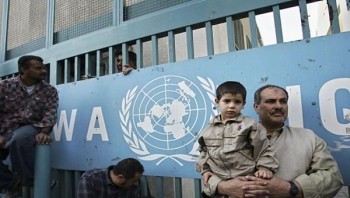 In December 2012, thousands of Palestine refugees fled air strikes, clashes and shelling in Yarmouk camp, Damascus, seeking shelter in UNRWA buildings. Among them are people like 45-year-old Nidal, currently sheltering in UNRWA’s Damascus Training Centre. A long-term sufferer of hypertension and diabetes, Nidal is unable to afford life-saving medicine.
In December 2012, thousands of Palestine refugees fled air strikes, clashes and shelling in Yarmouk camp, Damascus, seeking shelter in UNRWA buildings. Among them are people like 45-year-old Nidal, currently sheltering in UNRWA’s Damascus Training Centre. A long-term sufferer of hypertension and diabetes, Nidal is unable to afford life-saving medicine.
Nidal lost his main source of livelihood as a taxi driver when he and his family fled to the training centre three months ago. He is anguished by the violence he witnessed in Yarmouk. “I am still traumatised over the events that took place”, he says.
Coping with disease
"Learning how to live with diabetes and hypertension takes time,” says Nidal. “I have good days and bad days. Times of stress may be the hardest. When people who have diabetes are under stress, they have more trouble controlling their blood sugar levels and blood pressure.”
"I feel safe here, but I face other problems, like providing education to my son and a lack of medicines at the local market."
For many like Nidal, sheltering from the violence but in need of regular medicine, the difficulty of physically accessing health care is making life particularly difficult, explains Dr. Husam Tibi, chief of UNRWA’s health programme in Syria. “Unrest, displacement and the economic consequences of the conflict are major factors that result in the inability of many to reach our health centres”, he says.
“I have to provide for my children”
Today, Nidal has been forced to buy his own medicine, because he is unable to access UNRWA’s health centres. “Before the escalation of violence in Yarmouk, I used to go to the UNRWA-run health centre and get my medicine there,” he explains, adding that he cannot afford the new burden of medical costs. “I don’t have money for this medicine.
“I have to provide for my children and ensure that they receive a good education. These are more pressing concerns than my health.”
In the meantime, Nidal is doing his best to cope with the disease by following a special diet to control his blood sugar.
According to Dr. Tibi, UNRWA health staff in Syria have had to react rapidly to ensure that Palestinians in the war-torn country still have access to health care. Despite UNRWA’s support, many Palestine refugees continue to bear the brunt of a nearly two-year old conflict.
Nidal and his family are now safe in UNRWA’s Damascus Training Centre, but their future is uncertain. A strong-willed patient, Nidal is trying to remain optimistic. “I am unable to work, so I spend my time reading. Fortunately, my family is very supportive. My children are my life, and they are the reason why I feel I can overcome my struggle with disease.
“I don't know what the future holds, but as a father of three, I dream about the day that my talented children will be able to continue their education.”
UNRWA is currently sheltering approximately 12,000 internally-displaced people in its facilities throughout Syria.
Support UNRWA’s emergency response in and around Syria.





